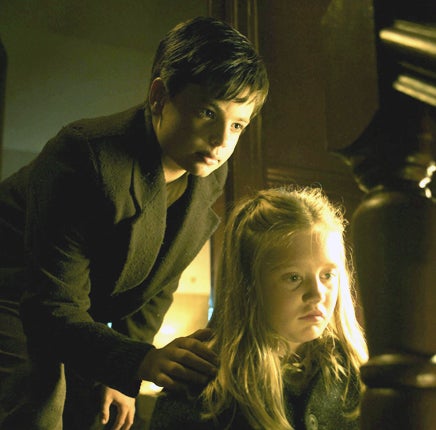The Runaway, Sky1, Thursday <br/> Neil Morrissey: Care Home Kid, BBC2, Monday & Thursday
A grim Sixties underworld drama, and Morrissey's lost childhood

Amid the cocktail cabinets and coiffures, the early 1960s are easily recast as a golden age when the material comforts of modernity and old-fashioned values struck a harmonious balance. But if the visual pleasures of Mad Men – largely responsible for our recent burst of nostalgia – occasionally risk eclipsing the seamier reality, new drama The Runaway is a blunt reminder that it wasn't all peachy prosperity – particularly on this side of the pond.
Adapted from Martina Cole's bestseller, the first instalment took us to the grim terraces of the East End of London where teenage sweethearts Cathy and Eamonn live among even grimmer people. No mod cons or nuclear families here: "I know I'm a shit mother, but I love you," Cathy's mother Madge, a tart with something only vaguely approaching a heart, tells her. By the end of the hour, Cathy had been carted off to a children's home and Eamonn had shot a member of a rival teen gang. "They'll hang you," Cathy warns, with chilling reference to those good old-fashioned values.
Since the remaining five episodes will race through the 1960s and 1970s, tracking the pair through the underworlds of Soho and New York (perhaps we'll bump into Don Draper along the way), the pace looks set to accelerate. A few characters come a little too directly off the peg, but the cast wears its clichés lightly – Keith Allen's dodgy geezer is surprisingly endearing thanks to a terrible toupée, Kierston Wareing draws complexity from Madge, a bargain-bin Bardot, and, as Cathy, newcomer Joanna Vanderham captures vulnerability thickened by cruel experience. A solid start, then, and with Alan Cummings and Ken Stott pitching up respectively as a cabaret queen and gangster boss this week, it looks like a grower.
There were certainly no rose-tinted views of the past in BBC documentary Neil Morrissey: Care Home Kid. In fact, the Men Behaving Badly actor had only the haziest impressions of his childhood and the seven years he spent in care after being caught shoplifting, aged 10. Morrissey trawled through his social services file and revisited the places where he grew up in order to fill in his sketchy history, drawing a wider picture of the current care system through interviews with professionals, fosterers and a handful of the 90,000 kids currently looked after by the state.
But the two-parter had none of the easy satisfaction of the "emotional journey". Despite its deeply personal content, Morrissey's commentary rang strangely hollow and even during reunions with family members and fellow care kids, he appeared to be going numbly through the motions. Frustrating at first, it finally marked the programme's strength – everybody Morrissey interviewed who had grown up in care, even the success stories, spoke of a detachment from their past, as well as from present relationships. In a rare angry moment, Morrissey noted the irony of the phrase "case closed" scrawled on his social services report and, to its credit, the documentary avoided any similarly neat resolutions.
Subscribe to Independent Premium to bookmark this article
Want to bookmark your favourite articles and stories to read or reference later? Start your Independent Premium subscription today.

Join our commenting forum
Join thought-provoking conversations, follow other Independent readers and see their replies